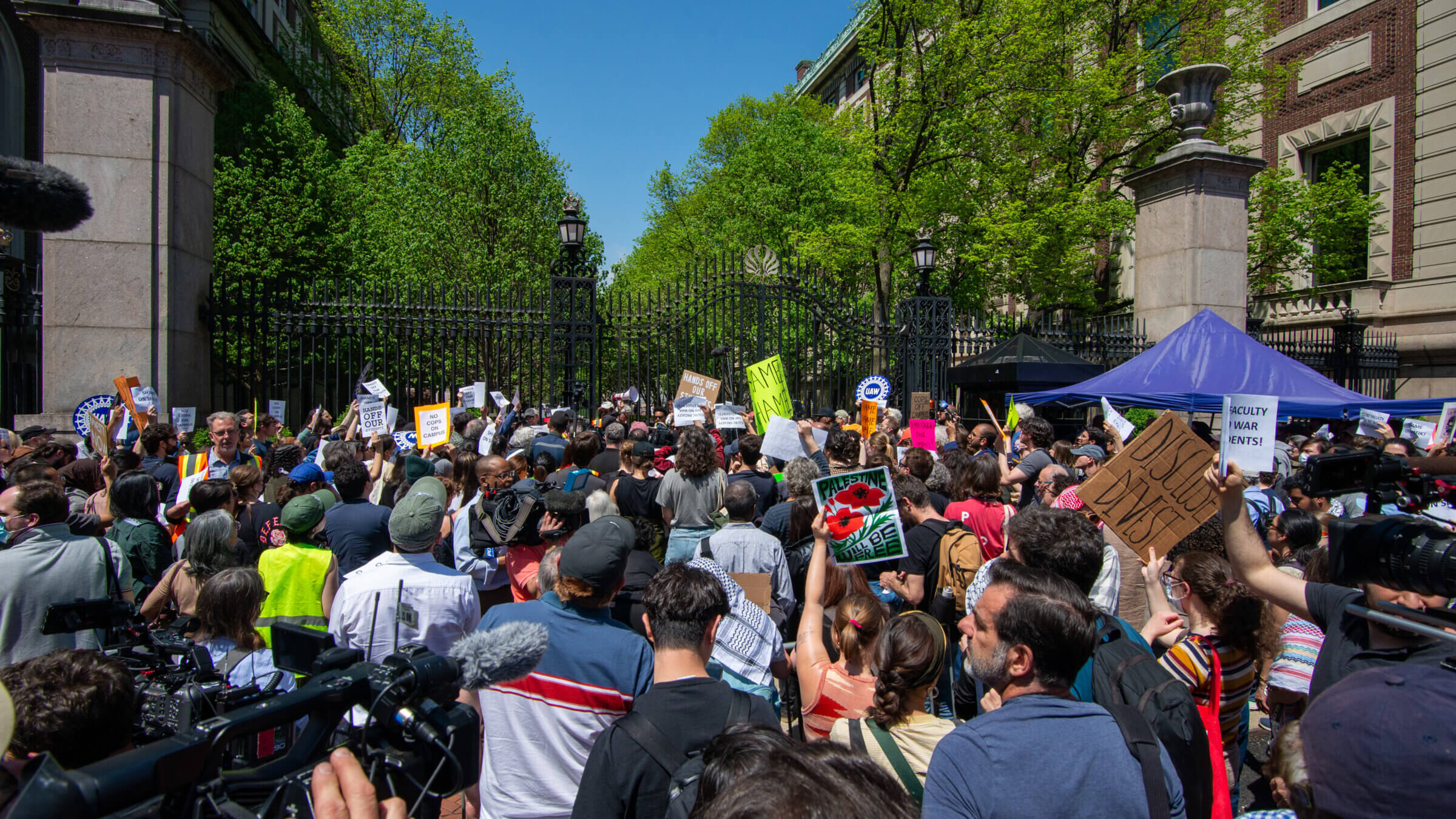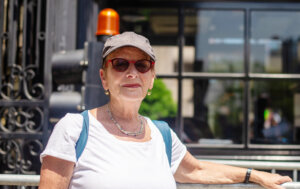Final exams at Columbia upended amid campus turmoil
Protests continue, but outside the campus gates

A rally outside Columbia University’s gates to protest the arrest of scores of students and the presence of New York City police on campus May 1. Photo by Alec Gitelman for the Forward
Final exams at Columbia University were supposed to start in person on Friday, but protests, arrests and suspensions upended the end-of-year schedule on campus, where the university president has asked police to patrol through the May 15 graduation.
“Final papers, presentations, projects, or take-home exams that are due this week in classes should be reassigned later due dates,” an email from the provost informed students on Wednesday.
And all academic activities — including exams, faculty office hours and study sessions will be remote through the end of the term. Provost Angela Olinto asked faculty to modify their final assessments of students to take account of “the evolving campus situation.”
That may include, she wrote, “giving a take-home final, modifying the final’s weight, adjusting the grading policy such that the final exam does not negatively impact the final grade (i.e. a no-harm final), making the final exam optional, or canceling the final exam.”
The email arrived in students’ inboxes the morning after Columbia President Minouche Shafik called New York City police on campus to remove dozens of students who on Tuesday occupied Hamilton Hall, and to enable the university to break up an encampment on its central lawn on the Upper West Side of Manhattan.
Student protesters had said they would not voluntarily leave either the encampment — dozens of tents erected nearly two weeks before — or Hamilton Hall until Columbia divested from companies doing business with Israel.
The university, historically and in the past two weeks, has been the epicenter of protest movements. As in past days, only students who live in the center of campus were allowed into its center quad on Wednesday, and at noon about 100 students, faculty and their supporters rallied outside the campus gate at Amsterdam Avenue and 116th Street.
“We want justice! You say how? Unsuspend our students now!” they chanted, referring to those who had been suspended Monday by the university. Other students gathered at 1 Police Plaza in Lower Manhattan to support students arrested Tuesday — more than 100, according to the student-run campus radio station, WKCR.

Columbia faculty and staff made up a significant portion of rallygoers, and included Marianne Hirsch, a Jewish Columbia English professor emeritus and daughter of Holocaust survivors. She blamed the university for the tumult on campus, saying administrators failed to take student protesters seriously.
“I don’t think these negotiations were in good faith and I don’t think real concessions were made,” she said, pointing to Brown University as a model. On Tuesday, Brown administrators came to an agreement with student protesters that led to the voluntary dismantling of their encampment.
Threats of mass suspensions on Monday, and the occupation of Hamilton Hall on Tuesday night, has blared in news feeds, capping nearly two weeks of turmoil on college campuses where students across the nation followed Columbia students’ lead, erecting “Gaza Solidarity Encampments,” and occupying buildings.
So many people were tuning into Columbia’s student radio station — more than 13,000 WKCR reported Wednesday — that many could not listen to it online. On-air hosts directed New York-area listeners to tune into the station on their radios, and others to Apple Music.
In an email to students Wednesday, Shafik tried to justify calling police to campus the previous night, a move her critics called “overkill” and “shameful” at rallies and on social media.
“This drastic escalation of many months of protest activity pushed the university to the brink,” she wrote, “creating a disruptive environment for everyone and raising safety risks to an intolerable level.”
She said it would take the university time to heal.
“We also must continue with urgency our ongoing dialogue on the important issues that have been raised in recent months, especially the balance between free speech and discrimination and the role of a university in contributing to better outcomes in the Middle East,” she added.
“Both are topics where I hope Columbia can lead the way in new thinking that will make us the epicenter, not just of protests, but of solutions to the world’s problems.”
Alec Gitelman contributed to this report.















